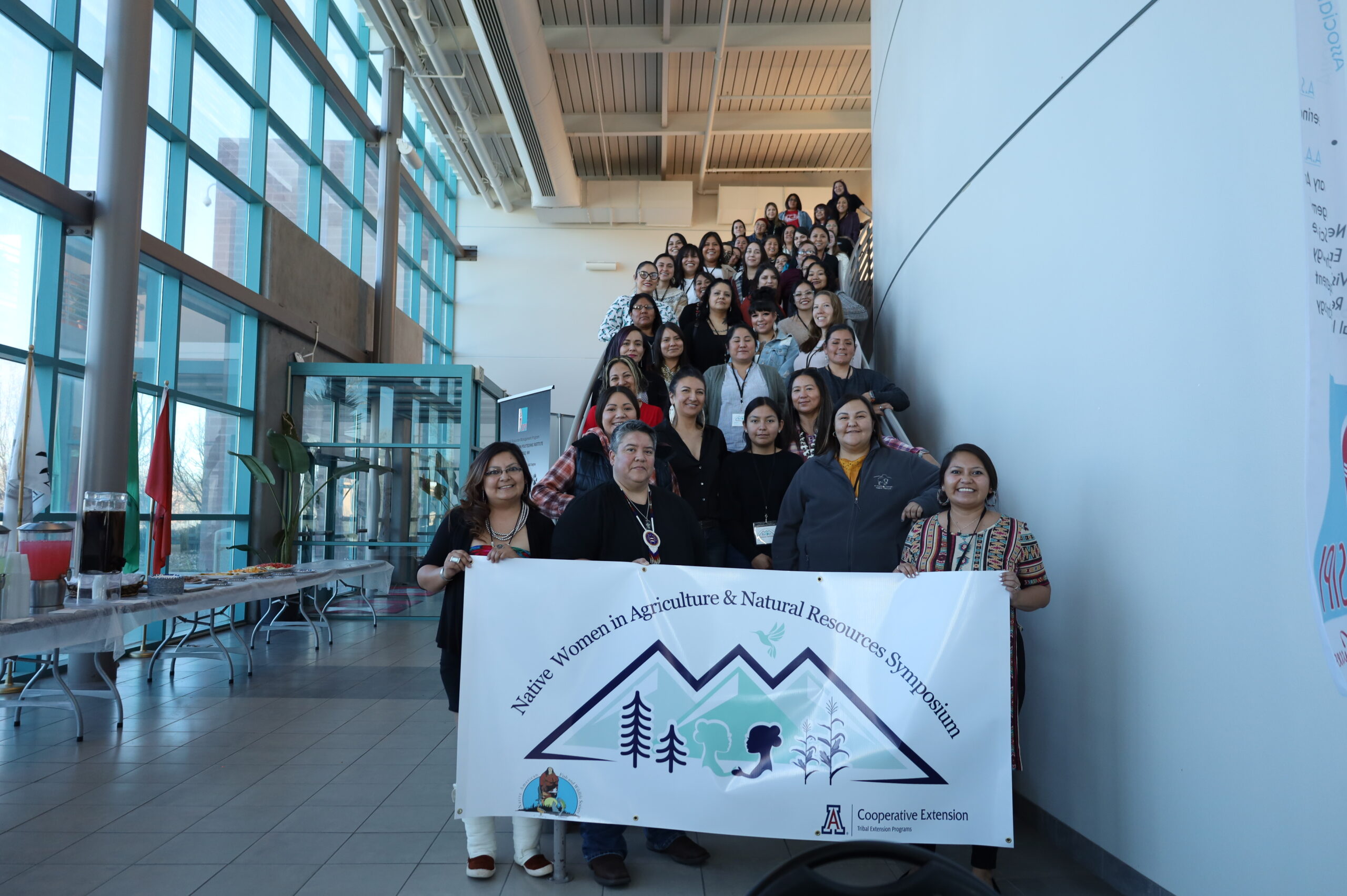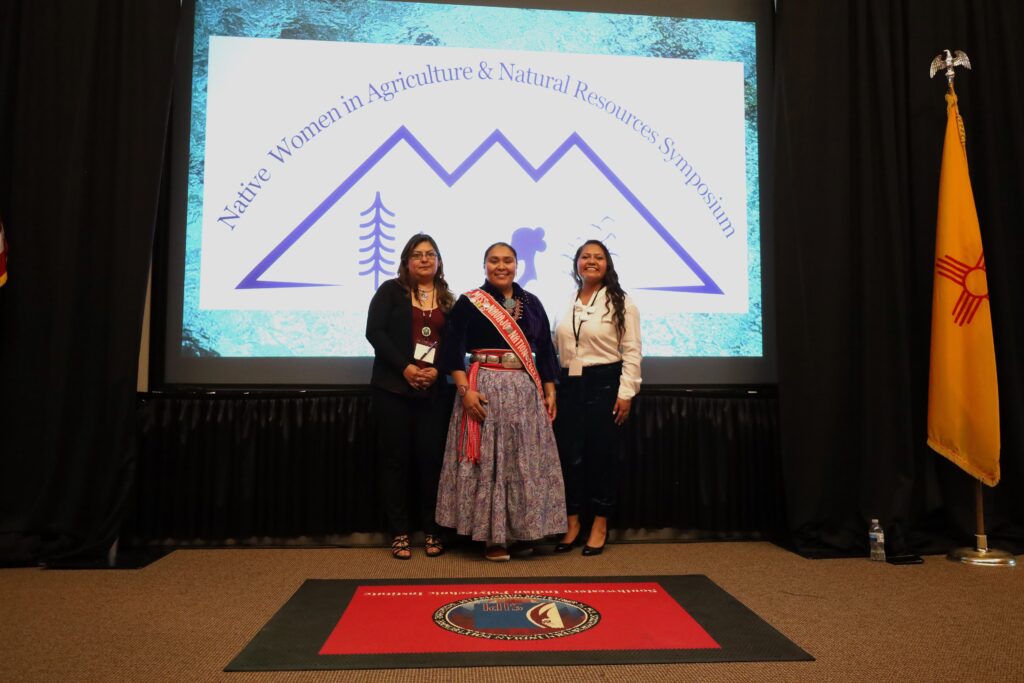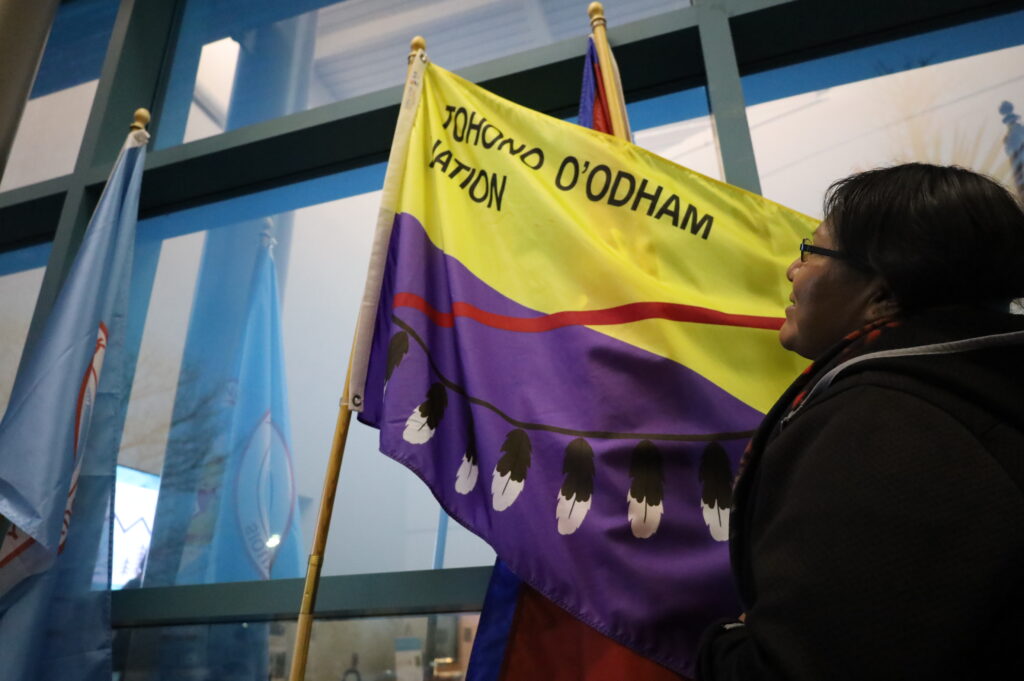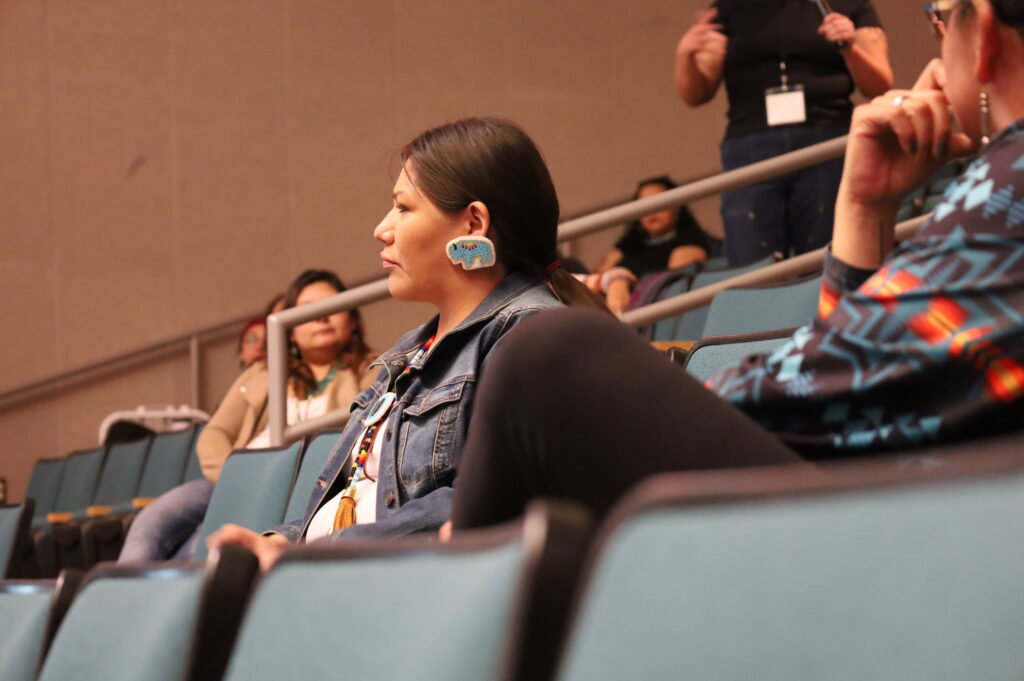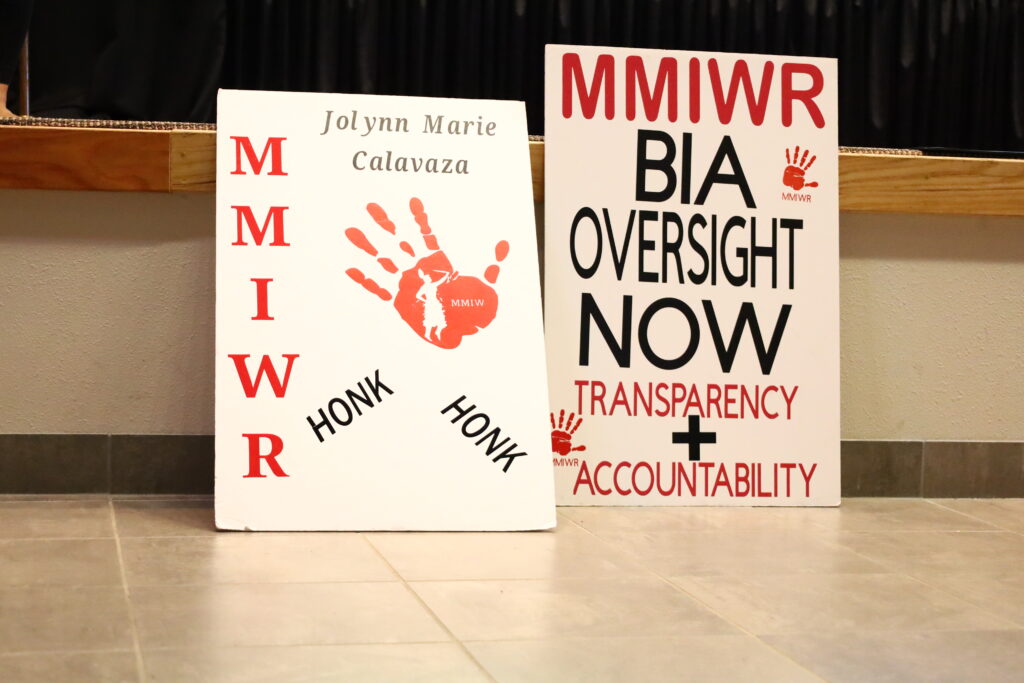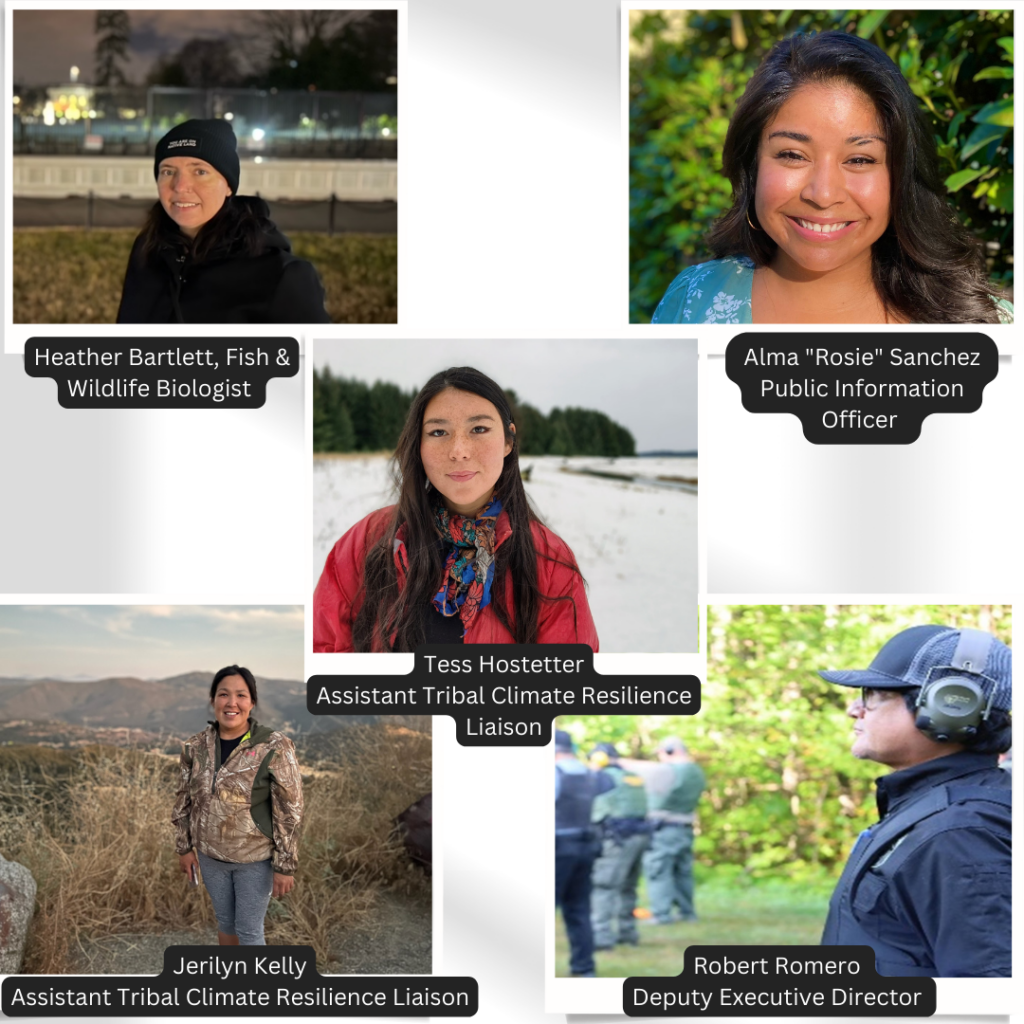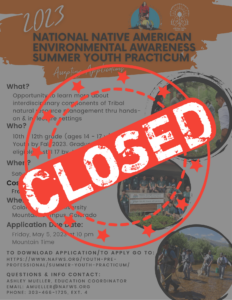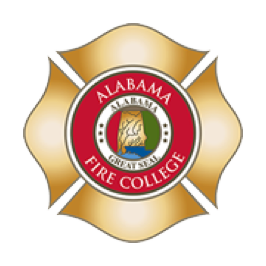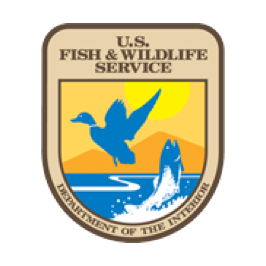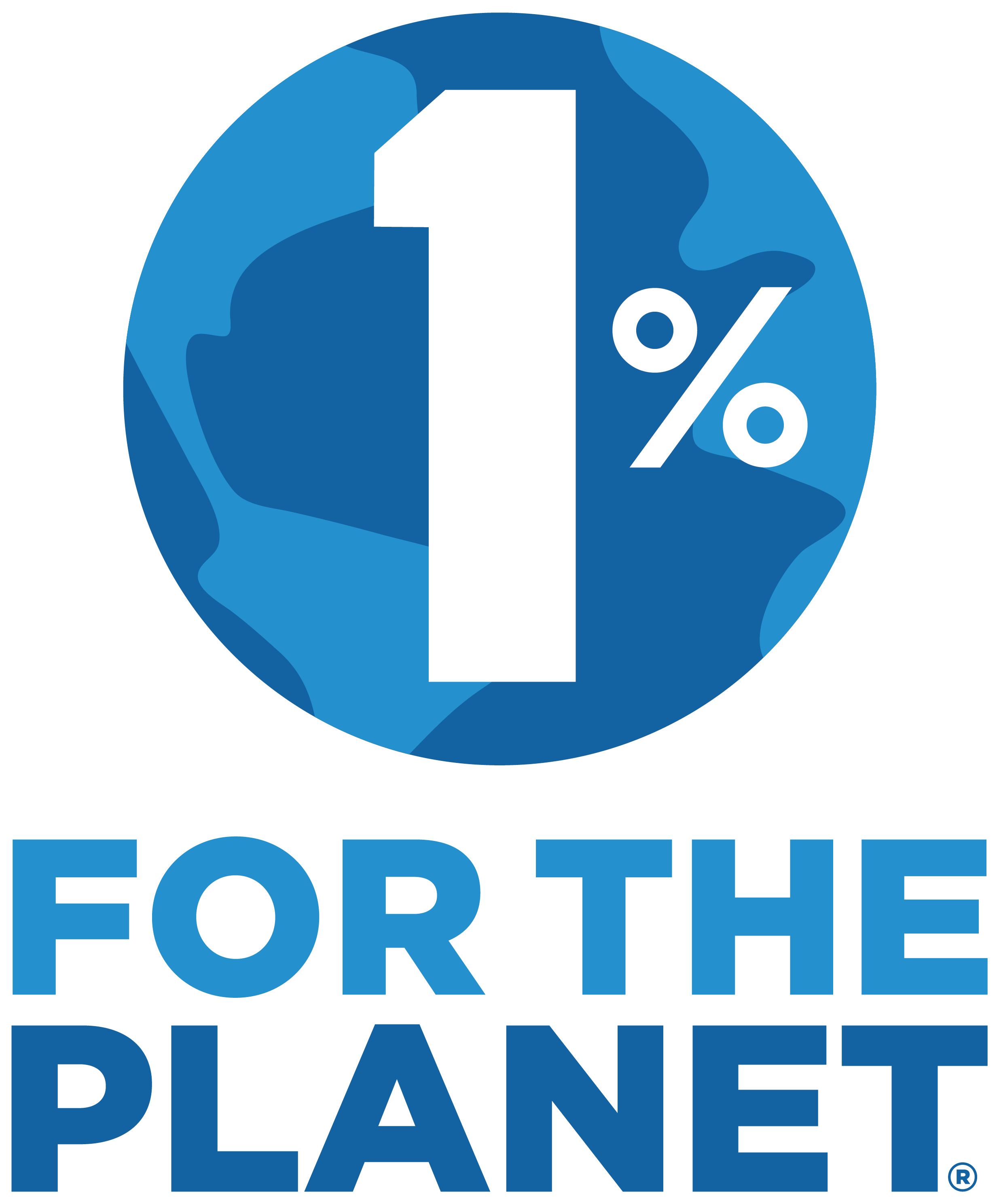Spring 2023 – From the Eagles Nest Newsletter
From the Eagle’s Nest
Spring 2023
What an incredible season of growth we’ve experienced over the past 3 months! We’ve enthusiastically welcomed some truly amazing additions to our team, and have been diligently providing technical assistance on the grant front and offering valuable professional development opportunities. As we look ahead to the next 3 months of 2023, we are filled with excitement and anticipation for the opportunities and achievements that lie ahead!
Featured Articles
Message from the President
Message from the Executive Director
Native Women in Agriculture and Natural Resources Symposium
New NAFWS Hunter’s Education Program
Conservation Law Enforcement Officer Update
National Coastal Resilience Fund
America the Beautiful Challenge Funding Opportunities
Recovering America’s Wildlife Act (RAWA)
Staff Additions
Education Update
The Bio Corner
Invasive Species
Alaska Tribal Climate Resilience Liaison
Funding Sources
40th Annual National Conference
Upcoming Events & Jobs
NAFWS in the News
Message from the President
Pesha Tabeno (Good Day)!
This first quarter of the year has our staff “off and running”. It’s great to see our Society work for all of you – 2023 is going to be a busy year and will show great advancement. We have been fortunate to see our funding grow, not only from the Bureau of Indian Affairs, but from other federal organizations, foundations, membership fees, and investments. It’s important for us to work to educate other organizations about the important work that we do for fish, wildlife, conservation, and enforcement.
We have hired a lot of educated and talented staff that are new to their jobs and are getting to know you all and are learning the ropes with our Society family. They are ready and willing to provide Technical Assistance and training on many topics from grant writing, professional development, invasive species, wildlife corridors, climate change, conservation law enforcement, and more.
They are also busy planning our national conference that will be held in Anchorage at the end of April. It looks like it will be one of our best yet. It was great to see all of the abstracts come in (over 90); this shows that our membership wants to be involved and wants to share their work and expertise with others. Thank you all for your participation.
As President, my focus has always been on ensuring that our finances are taken care of. We have a great accounting contractor (MPI), proper checks and balances, ensuring that our financial reports are submitted on time and that our audits are completed within the required timeframe. We have Board members who also serve on a financial/audit committee that also look out for our funding. Our Executive Director, Julie Thorstenson, works hard to make sure that funding is monitored by staff and they are educated on the different pots of money that fund their positions. All funds are spent in accordance with program requirements and budgets that have been approved by the funding agents.
It has been great to see the students becoming active by attending our Summer Youth Practicum, attending webinars and traveling to conferences to share their research via poster boards. Seeing these young people interested in fish, wildlife, conservation and other related fields shows me that our natural resources are in good hands. They continue to learn from their elders, fellow mentors, doing field research, reading and by continuing their education makes me proud to be a part of the Society.
I have been fortunate to have been your President for the past four years (since 2019). I am so proud to see how our Society has grown under the leadership of our Executive Director, who also started in May of 2019. A new President will be selected at the Board meeting in Alaska. Whoever that may be, I wish them the best and know that they’ll be busy. It’s important for us to continue to change and grow.
Thank you for your membership and for being a part of our Society family. I wish you all health, happiness and great careers – continue to take care of your tribal lands, your staff, tribal fish and wildlife and of course your fellow tribal members. Keep that circle going and always be humble and pray for all beings.
Respectfully,
Elveda Martinez
NAFWS President & SW Regional Director- Walker River Paiute Tribal Member
Message from the Executive Director
Greetings NAFWS members, partners, and friends. Winter made one last appearance last week here in the Dakotas, forcing the postponement of the Great Plains Regional Conference. We are all in full conference mood here as we prepare for the 40th Annual National Conference in Anchorage, AK April 24-27, 2023.
The first quarter of 2023 has continued to be busy as we completed our funding reports and our 2022 Annual Membership Report. We welcomed five new staff members in January: Alma “Rosie” Sanchez, Public Information Officer; Tess Hostetter and Jerilyn Kelly, Assistant Tribal Climate Resilience Liaisons – AK; Robert Romero, Deputy Executive Director; and Heather Bartlett, Fish and Wildlife Biologist – Climate. You can read more about them HERE.
Along with an increase in staffing we also experienced an increase in funding with a General Operating Grant from the Hewlett Foundation and the America the Beautiful Challenge Field Liaison Contract. This funding allows us to continue to expand our internal capacity and the membership services we offer. We were happy to launch NCTC library access for NAFWS members in January. The announcement of NAFWS International Hunter’s Education Association – World Certification at the 88th North American Wildlife and Natural Resources Conference in March was also a huge accomplishment. We know removing access barriers to educational resources through the NCTC library and to hunter education is a step in the right direction. Please continue to follow us on our website and social media for upcoming events, trainings, and webinars.
We were pleased to see Recovering America’s Wildlife Act introduced in the Senate in March. We will be coordinating Tribal RAWA Coalition meetings, please contact NAFWS if you are interested in attending. We need to continue to stress the importance of Tribes’ need for base funding for fish and wildlife.
We have seen an increase in nearly every aspect of NAFWS including abstract submissions for the National Conference. We hired an IT contractor to help streamline and strengthen our IT, website and equipment. We are in the process of onboarding two Fish and Wildlife Biologists, an Administrative Assistant and hiring three Invasive Species Technicians, two GIS Technicians and two ATBC Field Liaisons.
We continue to grow as an organization and look for ways to better serve our membership with the conservation, enhancement and preservation of Tribal fish and wildlife resources. As always, if you have ideas for the NAFWS, please contact me or your regional director(s). We hope to see you in Anchorage!
Pilmaye ye,
Julie Thorstenson, Ph.D. (Lakota)
Executive Director
Native Women in Agriculture & Natural Resources Symposium
Ashley Mueller, M.S., Education Coordinator
Albuquerque, NM | March 2-4, 2023
In March, a new event that I worked with my co-lead, Alexendra Carlisle from University of Arizona Federally Recognized Tribes Extension Program (U of A FRTEP) to organize the first (hopefully, annual) Native Women in Agriculture and Natural Resources Symposium (NWANRS)!
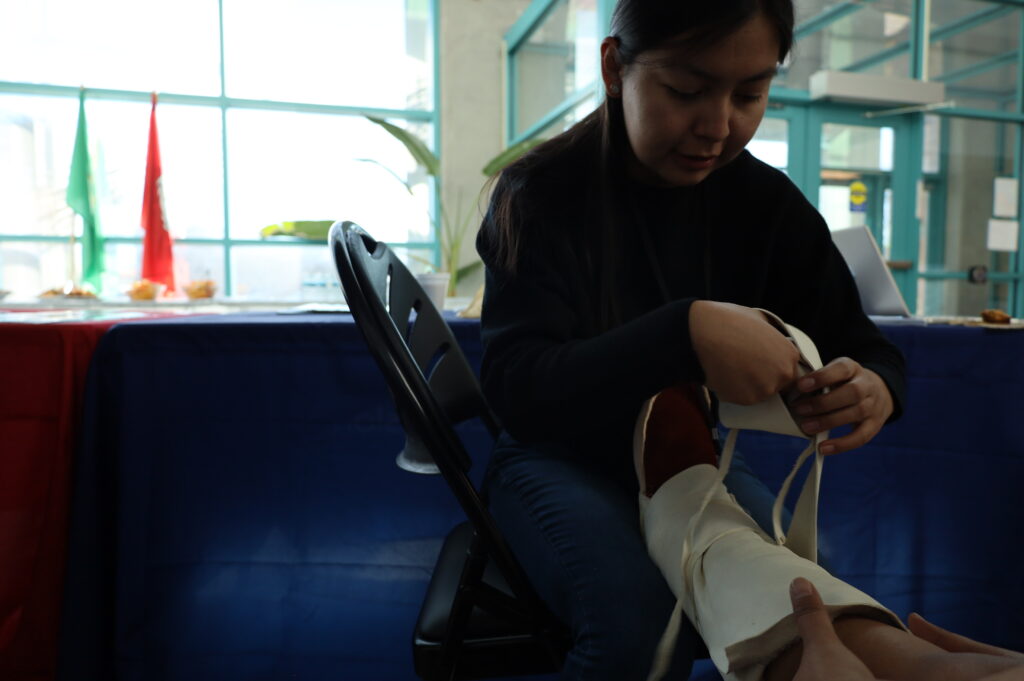 This event focused on American Indian/Alaskan Native women, led by American Indian/Alaskan Native women and for American Indian/Alaskan Native within the agriculture and natural resource sectors.
This event focused on American Indian/Alaskan Native women, led by American Indian/Alaskan Native women and for American Indian/Alaskan Native within the agriculture and natural resource sectors.
The NWANRS brought 82 Native women from across the country – Alaska,Wisconsin, California, Washington, New Mexico- that are doing work in natural resources and agriculture sectors. We had a welcoming from Miss Navajo Nation, Valentina Clitso, yoga session led by Stephanie G. from Ecotrust, Missing/Murdered Indigenous Relatives session led by Attorney Darlene Gomez, Self Defense Training led by staff from SMART Girl Defense and other sessions focused on topics such as workplace wellness, salary negotiation,women empowerment, leadership skills building, healthy relationship building, and safety. This event was held in the first week of March in congruence to International Women’s Month which made this event more impactful. Even more astonishing was that we had 29 individuals on our waiting list exemplifying the need and want for a space for learning, healing and professional development dedicated to our Native Women.
New NAFWS Hunter’s Education Program
Sean Cross, Fish & Wildlife Biologist
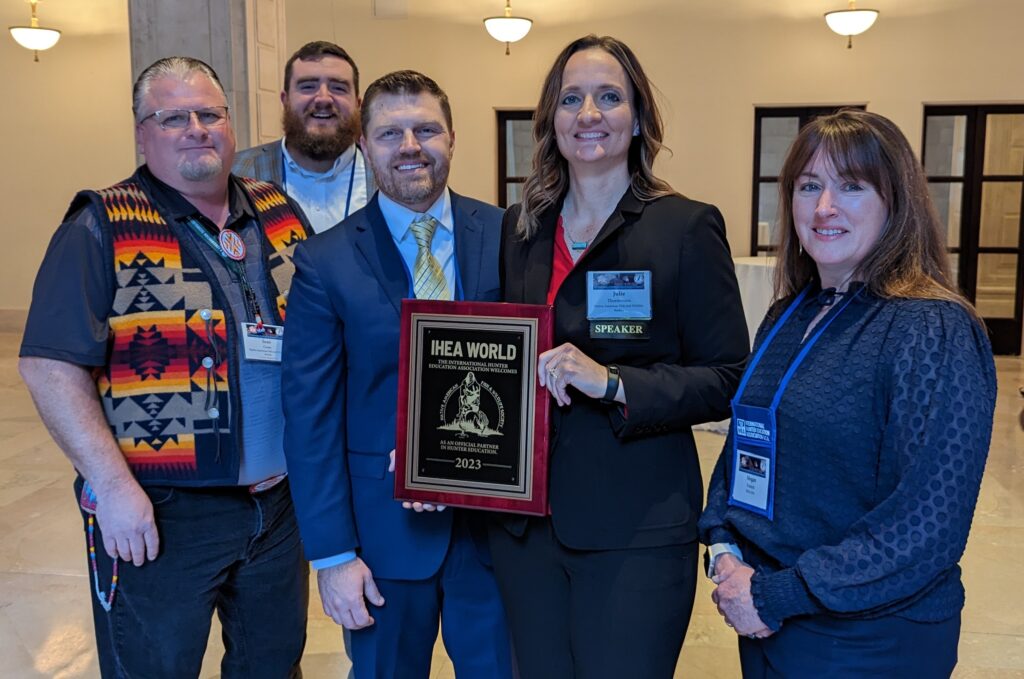 NAFWS has developing a certified hunters education program that provides Tribal Nations an alternative to state-run programs. Through this program, Tribes have the option to customize materials, utilize online training, and students will be certified in all 50 states, all ten Canadian Provinces and 17 foreign countries.
NAFWS has developing a certified hunters education program that provides Tribal Nations an alternative to state-run programs. Through this program, Tribes have the option to customize materials, utilize online training, and students will be certified in all 50 states, all ten Canadian Provinces and 17 foreign countries.
During the Bureau of Indian Affairs Great Plains Wildlife and Parks coordination call, an inquiry was made to the NAFWS staff about developing a hunter’s education course through the Society as an alternative to utilizing the state systems. As a result of this request, NAFWS Fish and Wildlife Biologist Sean Cross was tasked with researching and developing a NAFWS Hunter’s Education Program. Sean identified that the International Hunter’s Education Association (IHEA) sets and maintains the hunter’s education standards that are currently in use. The IHEA developed a basic course that has been adopted by all 50 states and 18 foreign countries – meaning a course taken in one state is recognized by all other participating states and nations. After working with the IHEA Executive Director, it was determined that the IHEA certification system will easily incorporate a NAFWS sponsored course that can be conducted in collaboration with any Tribe who wants to take advantage of the program.
The IHEA course curriculum has 10 standard requirements: Justification for Hunter Education and Hunting, Safe Firearms Mechanical Handling, Safe Firearm Field Practices, Hunting Regulations, Wildlife Identification, Key Wildlife and Management Principles, Hunter’s Role in Conservation, Responsibility to Wildlife, Hunter Best Practices, and Personal Responsibility and Behavior. Tribal Fish and Wildlife Departments have the option to customize additional material specific to their needs. The traditional method of an instructor lead course is still available, but there are now online options with or without in-person requirements and testing available.
In conversations with the IHEA director it was learned the National Rifle Association (NRA) already has an IHEA certified online course that was used by 1.4 million students in 2020 and 2021. Sean contacted the Hunter’s Education coordinator at the NRA and he graciously offered to modify their current online course, free of charge, to fit any NAFWS special training requests and any special requests or curriculum an individual Tribe may want their students to complete. The NRA online course is free of charge to students and can be taken at their own pace.
The next step was to develop an organized system of NAFWS certified instructors. IHEA already had plans to launch an online instructor certification and recertification database that will offer online continuing education courses for the instructors. So again, there was another opportunity to partner on a brand-new idea to “train the trainers” and make certain they remain actively certified.
The IHEA board of directors approved the online instructor system and the IHEA director launched the trainer’s website. Now we simply need to identify tribal staff who are existing state certified instructors and add them to the online system as NAFWS instructors. Once they are in the system, the instructors will have access to manage their profile and complete the necessary trainings to maintain their certifications. Instructor courses will be conducted regionally to train and certify new instructors, but the online system will still be used to track the status of instructors and offer an easier method to maintain their credentials.
On November 22nd, 2022 the IHEA-World board approved the NAFWS certification application and on March 22nd, 2023 the official announcement was made to all 50 State Fish and Wildlife directors at the Association of Fish and Wildlife Agencies meeting during the Wildlife Management Institute annual conference. NAFWS is currently working to get programs with the information they need to begin conducting their own courses.
Conservation Law Enforcement Officer Update
Robert Romero, Deputy Executive Director
Hello everyone. I hope spring is finally upon the many of you who’ve been dealing with some very unusual weather these days.
The first quarter of 2023 has been busy for our staff. We’ve been doing a lot of planning for various conferences, especially for our 40th NAFWS Annual National Conference in Anchorage, Alaska, and scheduling upcoming training for the year. We had to postpone the Great Plains Regional Conference due to severe weather, but plan to reconvene same location May 24-25, 2023! More details to come. Each of these events will have a CLEO training component and I continue to research other opportunities to develop a 40-hour training curriculum exclusive to our Tribal conservation officers.
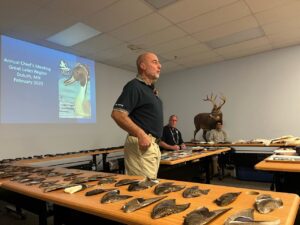 Earlier this year, we sponsored the Great Lakes Region’s Chief’s Meeting in Duluth, Minnesota from February 20-23, 2023, that was hosted by the 1854 Treaty Authority. The first day was filled with discussion surrounding regional updates, identification of training needs, and the Richard Fox Memorial Scholarship fundraiser. The following days were dedicated to
Earlier this year, we sponsored the Great Lakes Region’s Chief’s Meeting in Duluth, Minnesota from February 20-23, 2023, that was hosted by the 1854 Treaty Authority. The first day was filled with discussion surrounding regional updates, identification of training needs, and the Richard Fox Memorial Scholarship fundraiser. The following days were dedicated to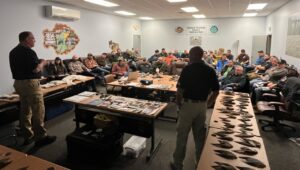 instruction on waterfowl identification by two retired U.S. Fish and Wildlife Service Special Agents who have decades of training experience and co-authors of the North American Waterfowl Identification Guide. The training was well received, and the camaraderie was exceptional!
instruction on waterfowl identification by two retired U.S. Fish and Wildlife Service Special Agents who have decades of training experience and co-authors of the North American Waterfowl Identification Guide. The training was well received, and the camaraderie was exceptional!
Planning continues to complete training agendas for:
- NAFWS 40-hour CLEO Training date and time TBD
- Southeast Regional Conference, August 14-18, 2023
- Southwest Regional Conference, August 2023
- Great Lakes Regional Conference, September 11-14, 2023
In December 2022, the NAFWS Board of Directors (BOD) approved a resolution to establish annual CLEO funding within BIA Division of Natural Resources and efforts are discussions are taking place on with staff and membership on moving this forward.
Lastly, the BOD approved the final 2021 CLEO Status and Summary Report which summarizes survey data and identifies shortcomings within the Tribal conservation enforcement realm. That report is available on the NAFWS website. The NAFWS will continue our work on the Tribal Conservation Law Enforcement Program Enhancement initiative in support of our member CLEOs.
Thank you all for what you do to conserve, protect and enhance our Tribal resources. Until next time…stay safe!
National Coastal Resilience Fund
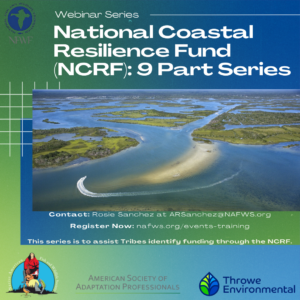 In 2022, Throwe Environmental expanded their reach as sole field liaisons to include the Native American Fish & Wildlife Society and American Adaptation Society of Adaptation Professionals. As Field Liaisons, Throwe, NAFWS, and ASAP conducted direct outreach, hosted conversations with potential applicants to develop project ideas, and troubleshoot with previous applicants as they consider reapplying for funding. In March, NAFWS wrapped up the last of our 9- part webinar series to help get Tribes prepared for applying for this funding available through the National Fish & Wildlife Foundation. The recordings of the webinars are all on the member resource page of our website available here.
In 2022, Throwe Environmental expanded their reach as sole field liaisons to include the Native American Fish & Wildlife Society and American Adaptation Society of Adaptation Professionals. As Field Liaisons, Throwe, NAFWS, and ASAP conducted direct outreach, hosted conversations with potential applicants to develop project ideas, and troubleshoot with previous applicants as they consider reapplying for funding. In March, NAFWS wrapped up the last of our 9- part webinar series to help get Tribes prepared for applying for this funding available through the National Fish & Wildlife Foundation. The recordings of the webinars are all on the member resource page of our website available here.
America the Beautiful Challenge Field Liaisons
On March 1, 2023, the National Fish and Wildlife Foundation (NFWF) released the official Request for Proposals (RFP) for the second year of the America the Beautiful Challenge (ATBC) funding program. The program is dedicated to funding landscape-scale conservation and restoration projects that implement existing conservation plans across the nation.
The Native American Fish and Wildlife Society (NAFWS) has been selected to be the 2023 grant cycle field liaisons for Tribal outreach and engagement. 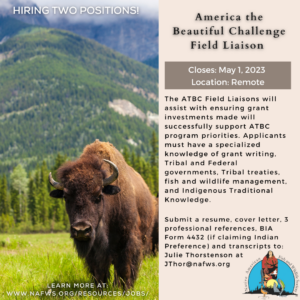
“NAFWS is excited to build upon the technical assistance we provided Tribal nations in the first round of ATBC and hopes to see an increase in Tribal projects funded. ATBC provides a much-needed stream of funding to assist Tribes in the conservation, protection and enhancement of their fish and wildlife resources,” says Julie Thorstenson, PhD. Executive Director of the Native American Fish and Wildlife Society.
NAFWS will conduct direct outreach, host conversations with potential applicants to develop project ideas, troubleshoot with previous applicants as they consider reapplying for funding, and be a resource hub for Tribes in the process of applying for funding. NAFWS will also host virtual and in-person peer-to-peer learning event(s) throughout the 2023 grant cycle.
Fourteen Tribal Nations were awarded funding through the ATBC grant cycle in 2022. NFWF expects to award at least ten percent of ATBC funding to Tribal Nations. Competitive grants will conserve, restore, and connect habitats for wildlife while improving community resilience and access to nature.
Recovering America’s Wildlife Act (RAWA)
On March 31st, Senator Heinrich and Senator Tillis introduced the Bi-Partisan Recovering America’s Wildlife Act Bill into the 117th congress. The Recovering America’s Wildlife Act will dedicate $97.5 million to Tribal Nations and $1.3 billion to state-level conservation efforts for on-the-ground conservation projects — helping prevent wildlife from becoming endangered in the first place. Tribes proudly carry the responsibility and financial burden of not only conserving fish and wildlife on their lands, but also of participating in collaborative wildlife management processes and activities across federal, state, and private boundaries. Yet, Tribes have been left out of the main federal wildlife funding sources. For example, Tribes are not eligible to receive federal excise tax revenues available through the Pittman–Robertson and Dingell-Johnson Acts. At this moment in time, NAFWS is working with partners and having conversations with potential sponsors in the Senate and House to ensure this bill is successful and passes!
Staff Updates
NAFWS has been growing significantly since our last newsletter with wonderful additions to our team. Please join us in welcoming the newest staff to the team!
Education Update
Dąąn, the Navajo word for Spring! In Navajo the word “Spring” relates to the same word group as growth, fertility or new life. As an education coordinator of NAFWS, I reflect on Dąąn as it empowers my major responsibility to create and provide a space for learning and encouragement to our Native Youth – to help them grow. And this year, we are going to do just that with the education programs and altogether as an organization!
Planning for the 2023 National Summer Youth Practicum (NSYP) is well on the way! So far, we have about 10 applicants, with time for more applications to trickle in as the deadline is Friday, May 5th. Our NSYP has some great activities planned such as a ropes course, university tour, learning about fish management while rocking some classy waders/wader boots and much more!
With the planning of NSYP underway and knowing that supervising high school student’s can be a great learning experience to build mentorship skills – we are hiring a Summer Intern! One responsibility and work task that our summer intern will be assigned is helping plan the NSYP and serving as a counselor. The deadline to apply for the summer internship is May 5, 2023!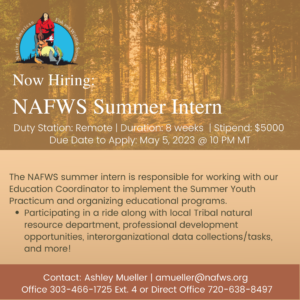
Our scholarship application will be opening in the first week of May! Keep an eye out for our scholarship fliers and applications. Scholarships are for enrolled Native undergraduate or graduate students majoring within the natural resources and conservation law enforcement fields.
My big ask to all of our members is to share these awesome opportunities, the NSYP and Internship, with students that you think will be interested or are a great fit!
For more information regarding our education programs, please visit: https://nafws.org/youth-pre-professional/ or contact Ashley Mueller.
The Bio Corner
Laurel James, Director of Programs
I am happy to announce the NAFWS Biologist team is now fully staffed! We have the following five biologists onboard. We aim to provide technical assistance to Tribes in the following capacities:
- Sean Cross – Fisheries, Hunter Education
- Shailyn Wiechman – Wildlife Connectivity & Corridors & CWD
- Heather Bartlett – Climate Change
- Hannah Juliussen – Biodiversity
- Emily Hagler – Threatened & Endangered Species
Our team has been super busy addressing National Coast Resilience Fund (NCRF) and America the Beautiful Challenge (AtBC) grant by providing technical assistance in developing pre-proposals and directly communicating with our partners from Throwe Environmental and the National Fish and Wildlife Foundation (NFWF), to assist Tribes in applying for this funding.
Closing out our Chronic Wasting Disease project, the NAFWS will be sponsoring attendance for six Tribes that participated in our CWD project and sent samples in to be tested, in the past two years. We will provide funding assistance for them to attend the 4th International Chronic Wasting Disease Symposium that will be held in Denver, CO; May 31-June 2, 2023.
Our team also works with Dr. Tolani Francisco, DVM of Native Healing, LLC to provide information, technical assistance, and support on wildlife health related topics. This year, Tolani is hosting a bi-monthly, One Health Webinar series, addressing some of the key environmental stewardship topics that impact Tribal communities. Check out our information related to the previous topics: Prion Diseases, More than Marijuana, Invasives Species & the Diseases they Bring. Join us for the next One Health Webinar entitled: Avian Health to be held on June 7, 2023 @ 1PM Mountain time. Registration information can be found on our website
Dr. Francisco, in partnership with Tim Linder of the Animal and Plant Health Inspection Service (APHIS), will provide a wildlife disease workshop at our National Conference in Anchorage, AK. In addition, Dr. Francisco will provide the “More than Marijuana” One Health awareness training for the Conservation Law Enforcement Officers (CLEO) in Anchorage, as well.
Also, at our National Conference and the rescheduled Great Plains Regional Conferences, Heather Bartlett in conjunction with our Alaska Climate Adaptation Team members, Kaitlyn Demoski, and Tess Hostetter, will hold a pre-conference workshop on Environmental Justice and Tribal Climate Resilience.
We recently completed a Fundamentals of R Programming course; this was a three 3-hour workshop that covered the Introductory Fundamentals of R Programming and was taught by Dr. Colton Miller. We are currently seeking feedback from Tribes on the potential of an in-person, R programming and data handling workshop for Tribes. Please reach out to us if this is of interest to you and your Tribe.
We have exciting news!!!! Keep your eyes peeled for information as we work out the details to offer a lot of training this year:
IN PERSON TRAINING:
Wildlife Crossing workshop (Shailyn): Durango, Co. June 11-13, 2023, details to follow
Chemical Capture: hosted by Penobscot Nation (Laurel), July 11-13, 2023
Pacific Northwest Tribal Bat Workshop (Sean): August 7-11, 2023, details to follow
Electrofishing (Sean): Vancouver, WA, late September, or early October
Chemical Capture (Emily): site and date to be determined (possibly in the southwest?)
Riparian Restoration (Heather): site and date to be determined
GIS & GPS w/ Wildlife Field Techniques (Hannah): site and date to be determined
Drone Training (Laurel): site and date to be determined
VIRTUAL TRAINING:
NEPA: June 13-15, 2023
As a membership benefit, we provide all the virtual training resources and webinars on our website via the Events & Trainings page. We look forward to seeing everyone at the National Conference!
Invasive Species
If you have been paying attention to national news lately, invasive species have been mentioned in some shape, form, or fashion almost daily. There have been news stories that involve invasive species that include folks expressing to their lawmakers their wish to see unwanted species removed from their local waterways, specific species being highlighted and recognized as problems in areas, and even a news story of a young girl having a run in with law enforcement as she was spraying lanternflies with a her own version of an insect repellent and collecting specimens to help stop the spread after learning about a “Stomp It Out” campaign at school. From the concerns of “super” pigs coming into the United States from Canada, the expanding spread of ranges for the Burmese python and Tegu, and the increasing concern of the risk of diseases, invasive species have been represented in some type of news media more and more. Whether it be local or national, talk of invasives is spreading as well, but will this talk ever catch up to the actual spread of these species?
There is no question that areas are experiencing climate shifts which in turn, are accompanied by species shifts as well. Invasive species are being identified in areas hundreds to thousands of miles from where they are normally found. As if not to compound the situation even more, the concerns of disease, especially zoonotic and foreign animal diseases, after the COVID pandemic has been a real concern for us all. With new species being identified in areas they have never previously been, invasive species have become an everyday concern with the public attention they are receiving. This only furthers the need to know what we have in our own backyards.
Invasive species are not detoured by land boundaries so the spread of these species into tribal lands is a real concern. It is time to be proactive rather than reactive. Time to begin inventorying what species we have on our respective lands and start planning on what course of management do we want to, or even need to, pursue to help minimize the spread of any non-native species that is present within our boundaries. Not to get too metaphorical, we must think of things as a sports team. To have a successful team, we must know the strengths and weaknesses of everyone involved, keep everyone is shape, and work as a team. This is the same for our respective lands, we must know what we have, where they are located, and what are their risks of impact.
The NAFWS Invasive Species Program is in the process of building staff for the program to vamp up our tribal engagement and technical assistance for Tribes regarding Invasive Species Management and Control. The program was introduced in February to our memberships via a webinar to give a brief overview of what to expect from the Invasive Species Program.  In the end of this webinar, we asked attendees to participate and share this Invasive Species Questionnaire Link for better understanding of tribal programs, so that needs and strategies could be prioritized to assist Tribes as the program begins to grow. For access to the Invasive Species Questionnaire link, please use the QR Code or website address. Let’s work together to identify problems and needs to prevent the spread of non-native species that are negatively impacting our tribal lands. For more information, please feel free to contact Mitzi Reed, Invasive Species Coordinator.
In the end of this webinar, we asked attendees to participate and share this Invasive Species Questionnaire Link for better understanding of tribal programs, so that needs and strategies could be prioritized to assist Tribes as the program begins to grow. For access to the Invasive Species Questionnaire link, please use the QR Code or website address. Let’s work together to identify problems and needs to prevent the spread of non-native species that are negatively impacting our tribal lands. For more information, please feel free to contact Mitzi Reed, Invasive Species Coordinator.
Alaska Tribal Climate Resilience Liaisons
Kaitlyn Demoski, M.A., Interim Senior Tribal Climate Resilience Liaison
The first few months of this year flew by! We’ve been busy attending conferences, conducting outreach, and planning up great ideas with our partners. After the National Conference we hope to get some major programs off the ground that will support Native Youth, Tribal conservation work, and Tribal Climate Adaptation in Alaska. We’ve continued to grow and expand the ways that we provide climate information to Tribes, including a new upcoming training series on community adaptation, this work is engaging and always evolving. It’s been a very encouraging few months going out and talking with people from all over the state who are excited to hear about our work in Alaska. We enjoy talking with people and listening to what they have to share 😊 After all, this is what guides our work and helps us make connections, hearing from tribal members.
In January we welcomed 2 new AK Liaisons Tess and Jerilyn who both have excellent experience to bring to the team, we also kicked off the first virtual meeting for the Bureau of Indian Affairs Relocation, Managed Retreat, Protect in Place (BIA RMP) Cohort. February, we had a booth and attended the Alaska Forum on the Environment, where one conference participant said that our booth was the most popular booth in the whole conference, and everyone wanted to talk with us. We promoted our new training series Strengthening Resilience Today; Looking Forward Looking Back. Our staff gave a presentation at our partners conference the Alaska Rural Small Business Conference hosted by Alaska Village Initiatives. Alaska Staff also attended a Climate Camp hosted by Chickaloon Village Traditional Council in Palmer AK, it was a good turnout for the community to come together and share the impacts of climate change they are seeing. We also helped facilitate the first in person BIA RMP Training Retreat. This was a 3 day retreat where communities who are facing RMP due to environmental impacts of climate change on their communities came together and shared their stories and resources with one another and learned from each other. Our March consisted of lots of exciting prep for the National Conference! Staff also attended the Alaska Tribal Conference on Environmental Management, The American Fisheries Society Alaska Chapter Conference in Fairbanks AK..
We have encountered some challenges in recent months, such as encouraging diverse entities involved in community planning to come together and form a team for community climate adaptation. Additionally, finding effective ways to address the training and technical needs of those working in Tribal Conservation Districts has been a priority. Nevertheless, there are also exciting prospects to anticipate, including the upcoming Community Climate Adaptation training series – “Strengthening Resilience Today.” Moreover, the National Conference Field Trips offer a unique opportunity to hear from local Tribes and learn about their work, allowing for meaningful exchanges with people from various Tribal Nations.
 In summer 2023, NAFWS is sponsoring two Alaska Native participants to joinInspiring Girls* Expeditions Alaska (IG*E). Programs of Inspiring Girls* are unique, free 12-day expeditions for high school-aged youth that combine field science, artistic inquiry, and outdoor exploration in inspiring locations around Alaska. Programs are led by a team of professional scientists, artists, and outdoor guides, and focus on alpine ecosystems through glacier mountaineering (Girls* on Ice), coastal marine ecosystems by sea kayak (Girls* on Water), and the boreal forest ecosystem through packrafting and hiking (Girls* in the Forest), Participants from around Alaska and beyond are supported in stepping outside of their comfort zones in an encouraging and fun environment with peers from all different geographies, backgrounds, and identities, while connecting to nature during a once-in-a-lifetime science and outdoor learning experience.
In summer 2023, NAFWS is sponsoring two Alaska Native participants to joinInspiring Girls* Expeditions Alaska (IG*E). Programs of Inspiring Girls* are unique, free 12-day expeditions for high school-aged youth that combine field science, artistic inquiry, and outdoor exploration in inspiring locations around Alaska. Programs are led by a team of professional scientists, artists, and outdoor guides, and focus on alpine ecosystems through glacier mountaineering (Girls* on Ice), coastal marine ecosystems by sea kayak (Girls* on Water), and the boreal forest ecosystem through packrafting and hiking (Girls* in the Forest), Participants from around Alaska and beyond are supported in stepping outside of their comfort zones in an encouraging and fun environment with peers from all different geographies, backgrounds, and identities, while connecting to nature during a once-in-a-lifetime science and outdoor learning experience.
(IG*E Alaska is housed within the AK CASC, see it linked on our website here https://akcasc.org/engagement/inspiring-girls-at-uaf/ )
Funding Sources
NAFWS serves as a hub for funding opportunities available to Tribes. Below are current opportunities for funding. We work to consistently keep you apprised of new funding so be sure to check our Funding Resources Page periodically!
Equity in Conservation Outreach:This is the second year that Equity in Conservation Outreach funding has been available. In 2022, seventeen proposals submitted by Tribal Nations and tribal organizations were funded for a total of 7.5 million dollars. The funding for 2023 is pretty robust, (up to 70 million dollars) for this round. It might be a while until we see this productive opportunity to increase our market penetration for NRCS programs with tribal producers and tribal community agriculture in general. Projects should support outreach activities that encourage diverse and inclusive participation in NRCS programs and introduce conservation planning and climate smart practices to protect farmland ecosystems, watersheds, and wildlife habitat in geographical areas of underserved communities ranging from rural agriculture to urban and small acreage producers. Projects which provide opportunities for students to pursue careers in agriculture, natural resources, and related sciences are also strongly encouraged. Federally recognized Tribal Nations, State recognized Tribal Nations, and tribal organizations are all eligible entities. The link below has more information, including links to a prerecorded webinar and links to four live webinars for applicants coming up in March. The proposal submission deadline is April 27, 2023. Specific questions from applicants should be submitted to [email protected].
2023 Tribal Wildlife Grants (TWG) Program Funding Opportunity Announcement (FOA, Funding Opportunity Number F23AS00257) : The FY 2023 TWG FOA closing date is June 23, 2023. In FY 2023, Congress has appropriated $6.2 million to fund TWG. Since its inception in 2003, TWG has awarded more than $111.6 million to Federally recognized Tribes supporting 626 conservations projects throughout Indian Country. These projects have benefited a wide range of fish, wildlife, and habitat, including species of Native American cultural or traditional importance and species that are not hunted or fished. To fulfill Executive Order 14008 and meet Department of the Interior and Service priorities and commensurate with available appropriations, the Service is implementing a Third-Tier funding process. Third Tier grants target Tribes that have not received TWG Program funds in the past. The purpose is to increase Tribal fish and wildlife management capacity to address threats to tribally identified species, including threats associated with climate change. Additionally, the Service has implemented an electronic performance reporting system called TRACS (Tracking and Reporting Actions for the Conservation of Species – https://tracs.fws.gov) in order to document recipient performance and for reporting on national program accomplishments that deliver meaningful results consistent with the TWG Program’s authorizing legislation. TRACS data entry facilitates development of a complete Project Narrative that you may use as part of your application in GrantSolutions, if you choose to use TRACS prior to submission of your application. As outlined in the attached FY 2023 TWG FOA (F23AS00257) , please note that Tribes are encouraged but not required to use Standard Objectives or enter data in TRACS. If you elect to use Standard Objectives and the TRACS system, you may wish to review the TRACS Performance Matrix for examples of typical project objectives used in other WSFR programs. We encourage you to work with your Tribal Liaison or WSFR Regional Office if you have questions about selecting and articulating objectives in your Project Narrative, or you may review WSFR’s TRACS Training Options. For more information, please visit the Service’s Tribal Wildlife Grants Program website or Grants.gov.
America the Beautiful Challenge Grant: America the Beautiful Challenge (ATBC), which was launched in 2022, is dedicated to funding landscape-scale conservation and restoration projects that implement existing conservation plans across the nation. ATBC grant pre-proposals are due April 20, 2023, and the full RFP can be found here. Awards are expected to be announced in November 2023. ATBC is a partnership between NFWF and the Department of the Interior through the U.S. Fish and Wildlife Service, the Department of Agriculture through the U.S. Forest Service and the Natural Resources Conservation Service, the Department of Defense, and Native Americans in Philanthropy. In its first year, the program awarded 55 grants totaling $91 million, leveraging an additional $50 million in grantee match for a total conservation investment of $141 million. In 2023, ATBC has additional funding available as the program expects to award up to $116 million in grants. NFWF expects to award at least ten percent of ATBC funding to Tribal and Native Nations and three percent to U.S. territories. Competitive grants will conserve, restore and connect habitats for wildlife while improving community resilience and access to nature. Proposals are reviewed by a public-private committee of partners and technical experts, and funding decisions are based on the extent to which they meet the criteria listed in the RFP. NAFWS will conduct direct outreach, host conversations with potential applicants to develop project ideas, troubleshoot with previous applicants as they consider reapplying for funding, and be a resource hub for Tribes in the process of applying for funding. NAFWS will also host virtual and in-person peer-to-peer learning event(s) throughout the 2023 grant cycle. For more information on webinars, resources, and assistance in applying for funding, visit our America the Beautiful Challenge Member Resource page.
The Zoonotic Disease Initiative is a grant program focused on wildlife disease prevention and preparedness. Authorized under the American Rescue Plan (2021, H.R. 1319, Section 6003.3), the Initiative will provide up to $9 million in available funding to states, Tribes and territories to strengthen early detection, rapid response and science-based management research to address wildlife disease outbreaks before they cross the barrier from animals to humans and become pandemics. The highest priority for the funding is to increase organizational readiness and ensure a network of state, Tribal and territorial wildlife managers across the nation are prepared for zoonotic disease outbreaks. Strengthening partner capacity for wildlife health monitoring will allow for the early detection of diseases.The 2023 Zoonotic Disease Initiative Notice of Funding Opportunity is now available. Proposals will be accepted until 11:59 p.m. EST on April 20, 2023. Please reach out to Anna-Marie York ([email protected]) with questions.
The National Science Foundation: Planning Proposals to Catalyze Innovative and Inclusive Wildland Fire Science through Diverse Collaborations. NSF is calling for planning proposals focused on catalyzing innovative and inclusive wildland fire science through collaboration among diverse stakeholders and rights holders. Participants may include Tribal Nation and Tribal College and University (TCU) representatives, local community members, Indigenous researchers, and/or cultural knowledge holders. Budget requests must not exceed $100,000 per year (including indirect costs) for a total of $200,000, with a duration of up to 24 months. Prior to submission of a proposal, prospective investigators must submit a two-page description of the proposal concept to ascertain its suitability in responding to this DCL [email protected]. Planning proposals can be submitted at any time but should be submitted no later than May 31, 2023 for consideration during Fiscal Year 2023. Questions on planning proposal preparation or this DCL may be sent to [email protected]. Two webinars will be hosted by NSF Program Officers about the DCL and to answer questions. Webinar is over, you cannot register now. If you have any questions, please contact Webinar host Phillip Moulden: [email protected].
40th Annual National Conference- Anchorage, AK
The staff and board over here at the Native American Fish & Wildlife Society is getting excited to see you all at the 40th annual National Conference in Anchorage next week. April 24-27 is about to be our best conference yet! We want to set y’all up for success so here is a rundown of things you should know and keep in your arsenal to have a great time at this year’s conference! Online registration is now closed but you can still register in person!
- First and foremost: BE CAREFUL OF THE WILDLIFE. We always want to maintain proper distance from the wildlife and be respectful of our non-human neighbors at all costs. No selfie is worth putting yourself in harms way so please be cognizant and keep your distance
- Be sure to keep up with the Weather in Alaska as it is subject to change at ANY time. The Weather is expected to be in the low to mid 40’s while we are there with lows in the 20’s with some light showers and some clouds. Below is a list of things you might want to bring to prepare yourself for the weather and mud season in AK.
- Here is a short list of what we think would be helpful to bring to Alaska
- Running/ jogging/ walking shoes for the Salmon Fun Run/ Walk
- Rain Jacket
- Warm insulated coat
- Hiking boots that can double as Mud boots
- Reusable waterbottle
- Warm clothes/ layers
- Traditional casual and Traditional Formal wear for the traditional feast and banquet
- Business Cards for networking
- Silent auction items
- We have an amazing slate of presenters, workshops, and abstracts this year with so much to learn! Be sure to check out the agenda beforehand to make a plan of all the presetnations you want to attend. Access the agenda here.
- Workshops are free to attend for conference registrants! Please be sure to attend any you find interesting at no additional cost.
- Before the conference, please be sure to review our Conference Code of Conduct as well as our Covid Guidelines.
- Cash, Credit Card, and Check will be accepted at conference Registration with Heidi McCann.
- Additional Thursday banquet tickets for family members can be purchased at the registration desk.
- Please keep in mind that this is a professional conference. We want to be mindful and respectful of those that have children while also extending that same courtesy to those that paid a lot of money for this professional development opportunity.
- Children will only be allowed at the banquet. They are not to be in any concurrent sessions, workshops, presentations or natural resource tours.
- There is no hotel shuttle to and from the airport. Please plan to make your own accommodations to and from the airport. Uber, Lyft and taxis operate in Anchorage.
- If we are lucky, we might be able to see the Aurora Borealis (Northern Lights) this time of the year! Check in at the Aurora Forecast with the Geophysical Institue daily if you are wanting to see what the likelihood of witnessing them.
- Our education Coordinator, Ashley Mueller, has put together a list of restaurants in the area for quick reference. You can find the list here for your use.
We are excited to see you all in Anchorage! Please do not hesitate to reach out with questions with the caveat that we will get back to you as soon as possible.
Upcoming Events & Jobs
As always, we have so much on our calendars to look forward to. Be sure to check out our events page regularly for in person trainings, events, and webinars to help in your professional development! We also have our job board that is chalk full of new internal as well as external jobs updated daily!
NAFWS in the News
The Vanishing of Biden’s Biodiversity Agenda | The New Republic
